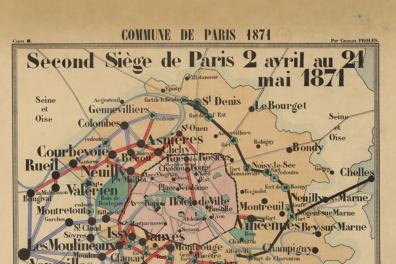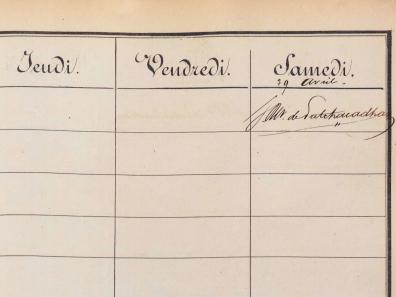Les Langues O' and the Paris Commune

On October 8, 1870, the Secretary General of the Ministry of Public Instruction, Saint-René Taillandier, contacted the school's administrator, Charles Schefer, to find out how many of its members, both teachers and staff¹, had joined the National Guard. However, because of their age, none of those present at Place Marcelin-Berthelot were likely to be mobilized. The administrator, a philosopher, nonetheless stresses that "everyone contributes to the defense of the country within the limits of their strengths and functions²". While the Collège de France housed a military hospital, and despite the bombardments, classes continued normally until the beginning of 1871. On January 18, however, a decree forbade students to meet in a building "repeatedly hit by enemy projectiles". The activities of several schools, including the Oriental Languages School³, are therefore suspended until February, two weeks after the armistice is signed by the National Defense Government on January 29 1871⁴.
But the troubles were not over, and following the signing of the armistice, the inhabitants of Paris rose up and formed the Paris Commune, which was violently repressed by Versailles forces. Teaching Oriental languages in this tumultuous context was no easy task. The situation, which seemed to improve from February onwards, rapidly deteriorated before classes were again suspended from April 1 to June 12, 1871. In the weeks leading up to the bloody clashes of "Bloody Week" (May 21 to 28, 1871), only one teacher seemed to continue teaching. This was Mr. Sandou Savérirayan Rattinassâmy Udhayar from Patchacaday, lecturer and first Tamil teacher at Langues O'. Normal activities were not finally resumed until June 12, 1871.

For the École, the period of the siege of Paris thus falls between the decree of 1869 and those of 1872 (which reformed it once again) and 1873 (which moved it to the hotel at 2 rue de Lille). From a certain point of view, therefore, the years 1870 and 1871 paradoxically constitute a kind of pause in the institution's history.
¹ Letter from the Ministry of Public Instruction addressed to the administrator of the École des Langues orientales dated October 8, 1870, 62/AJ/1, Archives nationales de Pierrefitte.
² Letter from the administrator of the École des Langues orientales addressed to the Minister of Public Instruction, 1870, 62/AJ/1, Archives nationales de Pierrefitte.
³ Order of the Ministry of Public Instruction dated January 18, 1871, 62/AJ/1, Archives nationales de Pierrefitte.
⁴ Order of the Ministry of Public Instruction dated February 13, 1871, 62/AJ/1, Archives nationales de Pierrefitte.